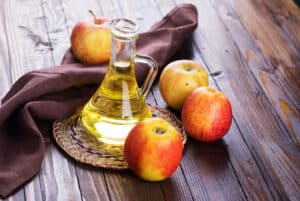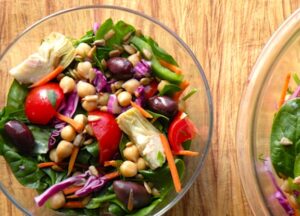If your diet is generally full of lots of servings of fruits, veggies, and grains on a daily basis, maybe you only need a multivitamin with the basics—vitamins A, B, C, D, E, and so on—with levels that are below or bring you up to 100 percent of your RDAs. With an adequate diet, you also receive many nutrients, and you don’t want to put your levels over the top or at a point where they actually start doing you harm instead of good.
If, on the other hand, you tend to not eat as well as you should more often than you would like to admit, think about taking a supplement with slightly higher doses. But remember, it isn’t wise to rely on supplements as your main sources of needed nutrients, so you really should be getting your eating habits in order. You owe it to yourself!
Read labels to be sure you’re receiving the proper dosages of nutrients and not falling under or over recommended dosages. Sometimes more is not better, especially when it comes to taking nutritional supplements.Taking excessive amounts of iron and vitamins A, B6, D, and E can be toxic, so keep this in mind when choosing a multivitamin. You should choose the one that best suits your needs … but how do you know which one to pick? First, analyze your diet. You know it’s important to eat well, but do you actually do it? How well you eat determines whether you need a multivitamin with megadoses of nutrients, or one with levels that provide you with part or all 100 percent of your RDAs for certain nutrients.
There will be times when you may want to take a specialized or single nutrient–type supplement. For instance, if you’re feeling a little sluggish, you may not be getting enough B vitamins. They are the real movers and shakers in your body, fueling many functions and adding luster to your hair, skin, and nails. During times of stress, your body can require even more B vitamins. If this applies to you, you may want to take a B vitamin complex supplement every once in awhile or at those times when you feel you’re especially in need of them. You’ll definitely feel a boost in your energy levels.
Most are familiar with taking a little extra vitamin C to build up your immune system and fight off colds. But be careful: taking too much vitamin C at one time can cause stomach upset, especially when taken on an empty stomach. If this is the case for you, look for “buffered vitamin C.” It should be gentler on your system.
Hot Potato
Excessive amounts of vitamin C can have a laxative effect. Some people even intentionally use vitamin C, in doses of 5,000 milligrams per day and more, as a natural laxative on an occasional basis to aid in regularity or to relieve constipation.
In recent years, it’s come to be known that taking a little extra vitamins C and E can actually help reduce the signs of aging and fight off many chronic diseases and cancer. Especially significant are their effects on preventing and treating skin cancer. Topical applications have had some amazing results for basal cell carcinoma victims. As it turns out, vitamin C is toxic to melanoma and causes it to dry out, leading to scabbing and eventually scarring over.
One of the best and most inexpensive forms of supplemented vitamin C is the crystalline form of ascorbic acid, available at natural foods stores. A mere 1⁄4 teaspoon mixed into a glass of water provides 1 gram (1,000 milligrams) pure vitamin C, and you don’t have to worry about the fillers that accompany vitamin C in its pill form, whether you’re a vegan or not.
Finding Vegan-Friendly Supplements
As a vegan, taking a supplement isn’t as simple as running down to the corner drugstore. For one thing, gelatin—that gelling agent often used to make the outer coating of many supplements—is derived from animals. If you see the words gel cap, you’ll have to do a bit of investigating to see if it’s a gelatin- or veggie-based gel.
Definition: Gelatin is a gelling agent made from boiling the connective tissues and skins of animals. It’s used in the manufacturing of many products, including foods, beverages, beauty products, pills, and even photographic film.
Some brands do say “vegi-cap” or “suitable for vegans or vegetarians” on their packaging if the gelling agent used is from plant sources. If it doesn’t say what the capsule is made of, it’s best to assume it’s made of gelatin and avoid it, just to be on the safe side. If you have an option of buying the supplement in different pill forms, avoid capsules and look for tablets instead because they’re usually gelatin free.
Also beware of supplements containing vitamin D3. In pill form, most vitamin D3 is derived from animal sources, so if you see vitamin D3 among the vitamins listed on your multivitamin, perhaps as cholecalciferol, it probably isn’t vegan. Recently, however, a few companies have started selling 100 percent plant-based D3. Instead, look for a vitamin D2 (ergocalciferaol) supplement, which is vegan, or simply be out in the sun for 15 minutes or less to get your D requirements.
You might be able to find some brands of vegan supplements in different drugstore and retail chains. But for the most part, you may have to search the shelves of your local natural foods store when first looking for vegan supplements.
A word of caution: supplements can be expensive, but you do usually get what you pay for. Look for those derived from natural sources whenever possible; supplements produced from food sources are much better in terms of bioavailability and safety.
Some popular vegan supplement manufacturers include Deva, Freeda, Garden of Life, Nature’s Life, Nature’s Plus, New Chapter, Rainbow Light, Solgar, and VegLife, just to name a few. After you find vegan brands you like, you can search for other sources and do a bit of shopping around and comparing prices. The internet is a great tool for purchasing vegan supplements at a savings. Check out Appendix B for some good websites where you can begin your search.
Reprinted with permission from The Complete Idiot's Guide® to Vegan Living* by Beverly Bennett and Ray Sammartano (Alpha Books, 2005).
- For more tips on plant-based nutrition, make sure to browse VegKitchen’s Nutrition page.
- For lots more features on healthy lifestyle, please explore VegKitchen’s Healthy Vegan Kitchen page.






Comments
No Comments